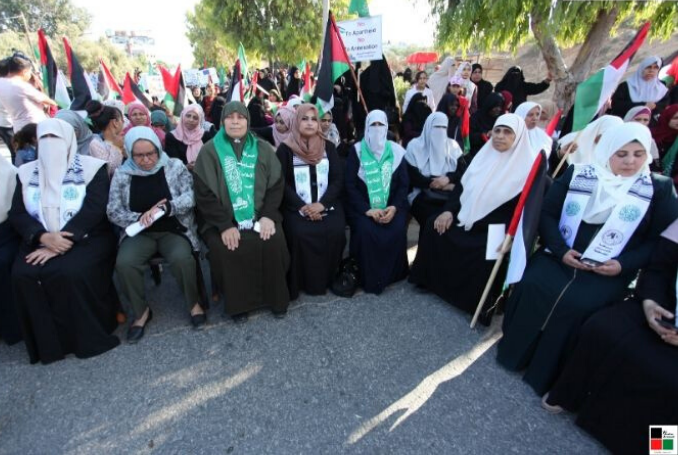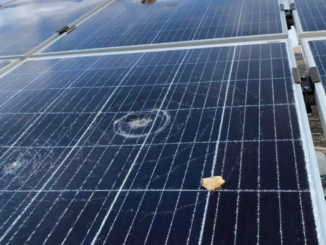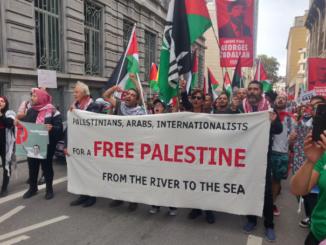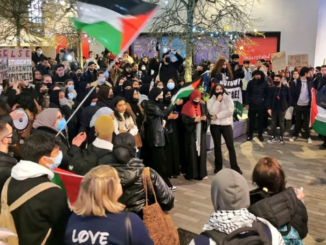
By Benay Blend
“Anti-imperialist politics also have to speak to the conditions of people in the US,” writes Onyesonwu Chatoyer, “if you want to win people in the US to anti-imperialism.” A cadre with the All-African People’s Revolutionary Party (AAPRP) and the All African Women’s Revolutionary Union, an editor with Hood Communist, and member of the National Coordinating Committee for the Venceremos Brigade, Chatoyer adds that “you’ll certainly get a minority of people” with the “moral type” of argument, but this country has been so “steeped in this ‘king of the world, this suffering is fine they deserve it” story for so long, that only a faction at best will be won over.
In an end-of-year broadcast on Palestine Chronicle TV, Israeli historian Professor Ilan Pappe reiterated this idea. In a conversation with political analyst and leader Awad Abdelfattah, Prof. Pappe shared his vision for what internationals can do to bolster the One Democratic State Campaign for a just and lasting peace.
Echoing Chatoyer’s suggestion, but focusing more on the Palestinian struggle, Pappe proposed that in the coming year internationals should begin to form networks with all those who are fighting colonialism and neo-imperialism too. Bolstering these transnational connections fosters the understanding that the Israeli Occupation is not something happening “over there,” but rather it has ramifications for populations in many countries, including the US, Honduras, and everywhere that neo-imperialism has its tentacles.
Two events of late, happening close by and elsewhere, bring this notion home.
On December 26, 2020, Brett Wilkins, Staff writer for Common Dreams, reported that Darrell House (Diné and Oneida) was tased by a National Park Service ranger when he walked off trail at the Petroglyph National Monument, in reality Tiwa land that features stone carvings sacred to the tribes.
According to House, he was harvesting dirt for ceremonies but walked off a marked trail in order to provide distance from a large group of walkers behind him. “Here, you will see a white man abuse his power,” House said.
“The law doesn’t work for the Indigenous… You would think with George Floyd and Breonna Taylor, with the Black Lives Matter Movement, authorities would try to avoid having to pull a weapon out. Imagine I disarm him from the taser then what, I get charged with assault, or worse he grabs for his gun and ends me.”
The Indigenous activist group Red Nation was quick to respond. In a collective statement, members declared that “public lands are stolen lands. Indigenous people have the right to practice their culture and spiritual ways on Indigenous land without fear of repression, discrimination, or violence.”
“Public lands are stolen lands” they continued. “Indigenous people have the right to practice their culture and spiritual ways on Indigenous land without fear of repression, discrimination, or violence.”
There are clear connections here with Black Lives Matter, but also with Palestinians who must contend with settler-colonial violence while going about their daily lives on what is in reality land that belongs to them.
For example, while Palestinians consider access to Al-Aqsa Mosque a right, Aziza Nofal reported that in the spring of 2019 Israeli authorities began instituting a series of confusing restrictions that allowed women of all ages to pray at the holy site but for men the right varied according to age group. Indeed, in May of that year occupation forces attacked Palestinians as they were leaving the Mosque, then used sound bombs and tear gas to disperse peaceful crowds.
Neither of these instances are random cases as both are part of daily life on their respective Occupied lands. As long as the notion of “public land” is normalized, as long as the Israeli Occupation is normalized, these incidents will continue to occur. The solution in both cases is land back to the original owners.
Taken together, both exemplify the connections that can be made between resistance movements in different parts of the world. In news from Honduras there is another example of the ways that neo-imperialism adversely affects the lives of Indigenous people who are trying to defend their land and natural resources from exploitation.
On December 26, 2020, four armed assailants shot Félix Vásquez, a leader of the Indigenous Lenca community, while he was at home with his family. As Nina Lakhani reports, his death comes five years after another Lenca activist, Berta Cáceres, was murdered by men later convicted for the crime, though none of the group who ordered the assassination have faced charges.
In the US, the protests at Standing Rock also met with violent repression from the same forces that make Honduras such dangerous ground for environmental activists. More than 70 water protectors were arrested during their stance against the Dakota Access pipeline.
“Our struggles are one,” reads a statement from the International Solidarity Movement (ISM). “The Palestinians, the Water Protectors and other activists in the US are all working for the same freedoms against the same oppressors.”
Similarities between what happens in Palestine and what also happened in Standing Rock are no coincidence. As the ISM points out, after 9-11 US police forces as well as Homeland Security, the Federal Bureau of Investigations (FBI) and Border and Customs Police (ICE) began sending their members to train in Israel.
Because training included counter-terrorism measures, crowd control, and protests, the same tactics—the use of high-pressure water cannons, rubber bullets, rubber-coated steel bullets, the use of attack dogs, and sound grenades—are used in both places, and for the same reasons—to maintain control of land and resources on land stolen from the rightful owners.
In Honduras, too, reports TeleSur, a multilateral military treaty between Honduras, Israel and the United States enabled the arrival of 1000 Israel soldiers to train the Armed Forces (FFAA) and National Police (PN).
According to Olivia Zúniga, a deputy from the Partido Libertad y Refundación, “the terrorists who impose terror against the Honduran people are those who shoot at us, that repress us, that shoot live bullets, that assassinate our people.”
She concluded that “it is clear that this is a war against the Honduran people that it will be against our people that they will use the military training of the Honduran army, that it will be against our people that they will use the bullets, torture, and violence. These are specialists in genocide, specialists in torture, which they do against the Palestinian people.”
In his concluding remarks, Ilan Pappe responded to the question of whether Israelis would actually support one secular state with equal rights for all. He suggested that the question should be reversed. By focusing on what a Palestinian vision of the future would look like, it’s possible to ignore what Israelis and their partners the US government might want to do.
“Public lands are stolen lands,” states the Pueblo Action Alliance. “Indigenous people have the right to enjoy themselves on the lands of their ancestors. It is a shame that the National Park Service will not acknowledge this relative and their right to pray but rather see them as violating National Park Service enforcement and law.”
By putting Palestinians, and by implication all people struggling against colonialism and imperialism, at the center, the way forward becomes quite clear”: instead of maintaining “public land,” back to the original owners to manage in a way that guarantees a better future.
– Benay Blend earned her doctorate in American Studies from the University of New Mexico. Her scholarly works include Douglas Vakoch and Sam Mickey, Eds. (2017), “’Neither Homeland Nor Exile are Words’: ‘Situated Knowledge’ in the Works of Palestinian and Native American Writers”. She contributed this article to The Palestine Chronicle.

– Benay Blend earned her doctorate in American Studies from the University of New Mexico. Her scholarly works include Douglas Vakoch and Sam Mickey, Eds. (2017), “’Neither Homeland Nor Exile are Words’: ‘Situated Knowledge’ in the Works of Palestinian and Native American Writers”. She contributed this article to The Palestine Chronicle.







